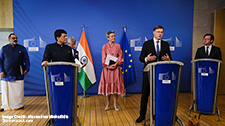Disaster Risk Reduction: Need for Collective Approach-Based Policy Measures

Kiran Bhatt, Anirudh Prem, Sanjay Pattanshetty and Helmut Brand
At the beginning of 2024, a massive earthquake struck Japan killing several people and displacing even more. However, the earthquake was only one instance of the various natural disasters experienced the world over in the year gone by, ranging from wildfires in North America to droughts in parts of Europe. Climate change has influenced the intensity and frequency of such disasters – causing immense economic damage. The effect of disasters is further amplified in regions already grappling with prolonged internal and cross-boundary conflicts.
The linkage between peace, climate, and conflicts has multiple security implications at the individual and societal levels. These complex vulnerabilities especially in conflict settings, island states, and developing countries demand the adaptation of holistic Disaster Risk Reduction (DRR) strategies, which not only help in mitigating risks but enhance capacities for sustained development in the aftermath. This issue brief discusses the possibility of adopting a collective approach enabled by cooperation at the regional and global levels while formulating DRR policies to address the gap between theory and practice.
Related Publications
-
Navigating the Indo-Pacific: How Australia and the EU Can Partner for Peace, Stability, and Prosperity
To navigate the choppy waters of the Indo-Pacific, the EU and Australia must be on the same wavelength regarding shared interests in rules, values, and an open and liberal economic […]
-
Trade, Connectivity and Supply Chains in EU-India Relations
In the decade and a half since 2007 when the EU and India first started their FTA negotiations, the world economic order has undergone a sea change. During that period, […]
-
ISDP Annual Report 2023
ISDP’s Annual Report for the year 2023. We look back on 2023, a year in which tensions and conflicts captured the strategic space in ISDP’s focus areas, making headlines around […]
-
India-Middle East-Europe Economic Corridor: Will It Get Subsumed by Its Grand Vision?
The recently concluded Group of Twenty (G20) Summit in New Delhi under India’s presidency was, undoubtedly, a crowning moment for India. From providing the G20 with new relevance among the […]
-
Kenya and the Indo-Pacific: The Rationale for an “Outlook” and Why Kenya (and East Africa) Matters
This issue brief argues that Kenya should carefully consider promulgating an Indo-Pacific outlook given the seismic shifts in global distributions of power and the resulting great power rivalry. The future […]




